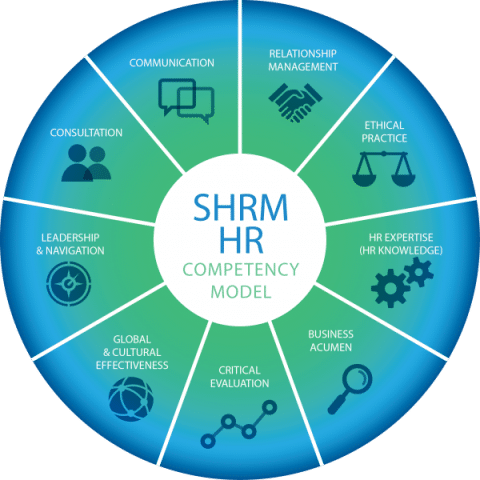Competency is defined as an ability or skill. Every profession has competencies. And we want competencies; they are the things that make us successful. You could say that jobs are made up of tasks (the actual things we do) and competencies (the skills we need to do them).
A couple of years ago, the Society for Human Resource Management (SHRM) created a competency model for human resources pros. Since then, SHRM has developed a certification that aligns with the competency model.
In my role as a SHRM special expertise panel member and as one of the initial item writers for the SHRM certification exam, I had the opportunity to hear an update about the certification program during this year’s SHRM Annual Conference in Las Vegas. I thought the update was well-presented and very relevant, so I asked Alex Alonso, PhD, vice president of the certification team, if he would share a few details with you. I’m delighted he said yes.
Alex, for those readers who aren’t aware, what is the SHRM certification and what does it represent?
[Alex] SHRM certification is the world’s first competency-based certification for early-career and senior HR professionals. These certifications are based upon SHRM’s rigorously-validated Competency Model comprised of the knowledge and behavior needed to succeed in human resources management.
We both know there are other human resources related certifications. What makes the SHRM certification different and valuable?
[Alex] I’m asked often what makes these credentials different. The answer is they focus on both knowledge and behaviors. The exams are designed to assess two things:
- The first part of that test is designed to assess knowledge through a written exam. The knowledge of HR held by examinees and an examinee’s ability to address difficult situations common to the HR profession. This is a lot like the drivers’ license tests we all know and love.
- The second part is a road test and this is designed to see how proficiently we behave as drivers. This results in a job-relevant exam, meaning examinees will encounter questions that reflect their day-to-day work.
Our examinees keep telling us about the job relevance factor and what it means for them as they sit for our exams. SHRM-CP and SHRM-SCP exams are designed to assess both.
Let’s talk specifically about those HR pros who are trying to decide between a PHR / SPHR and the SHRM-CP / SHRM-SCP. It’s a common comparison. How does someone evaluate their options?
[Alex] Certainly, we recognize the value of certification and what it means to earn one. For those considering HR certification, I would advise seeking a credential that demonstrates two things:
- A strong research foundation based upon competencies linked to job performance and job success.
- The ability to assess both knowledge AND behaviors leading to success.

For HR professionals with a PHR or SPHR, SHRM is currently offering a Pathway tutorial to receive the SHRM-CP or SHRM-SCP. First, why is SHRM offering this Pathway option? Second, does the Pathway diminish the value of the SHRM credential? And third, when does the Pathway tutorial option expire?
[Alex] Many HR professionals are taking advantage of a one-time eligibility pathway to SHRM certification. In fact, more than 54,000 HR professionals have used this method to earn their SHRM-CP or SHRM-SCP.
These professionals have worked hard to earn knowledge-based certifications and it is important to recognize this part of their professional development. The pathway allows these professionals to earn their SHRM certification while learning about the SHRM Competency Model and the extensive research underlying the model.
We have offered this pathway to certified professionals who want to earn a competency-based credential by focusing their professional development on core competencies that lead to career success. This option will be available until December 31, 2015.
What is the purpose of asking SHRM credential holders to recertify?
[Alex] Certification is only one step in the lifelong journey toward continuous improvement and learning. Recertification is a critical process for ensuring that HR professionals engage in learning activities consistent with proficient practice. It also allows for HR professionals to build proficiency in core competencies.
SHRM recertification is unique in that it calls for learning experiences tied to the SHRM Competency Model. To earn recertification, SHRM credential holders must demonstrate learning in three categories:
- Advancing Your Education with learning and development coursework
- Advancing Your Organization with developmental experiences
- Advancing Your Profession with service opportunities
Recertification is achieved when 60 professional development credits are earned within the category limits over a three-year period. To date, there are more than 47,000 ways to earn a SHRM professional development credit making recertification accessible to more than 50,000 professionals thus far. For more information, please see www.shrmcertification.org.
One last question, during the update at SHRM Annual, I heard the term microcredential or digital badge. Can you briefly explain the term and if the SHRM Certification Team might explore this in the future?
[Alex] SHRM is working on two key initiatives for credential holders. The first is offering a digital badge so that credential holders can add their credentials to profiles on social networking sites like LinkedIn. The advantage of these digital badges is that they can be verified by potential employers almost instantaneously when conducting background checks.
The second initiative is offering a catalogue of microcredentials in specialty disciplines. For example, we are developing a California-based microcredential (or certificate) for those individuals with SHRM-CPs or SHRM-SCPs who would like to demonstrate expertise in California law and legal precedents. Similarly, we will be exploring other potential microcredentials in other areas such as international employment law, talent management, and HRIS. These are in early stages of development and will be offered after pilot testing is completed.
A HUGE thanks to Alex for sharing the latest information about the SHRM Credential. I know there are lots of stories out there and it’s always good to hear information directly from the source. If you want to learn more about the SHRM Certification, check out their website or join their LinkedIn group. The regular application deadline for the Winter window is October 16 and the late application deadline is November 13, 2015.
SHRM Competency Model, logo and Alex Alonso image used with permission.
5









Tom Bolt says
I won’t dredge up the constant squabbling about the way that SHRM entered the certification business, but there are probing questions that are not answered. I don’t disagree with the high and noble goals to further the HR profession and give it credibility. When I decided to be SPHR and GPHR certified through HRCI there was never any question in my mind that I was doing it to prove something to myself and not to the world. Many of my professional friends questioned why I would even go through this when it didn’t matter. They were wrong about one thing: it did matter to me. When I made a conscious decision not to re-certify it was because I had done what I set out to do. My professionalism and continued learning never stopped, but I never saw any value added by those credentials.
There are a number of unfounded “statistics” used to say how valuable certification is in a career, but I have never seen a reference to the studies that produced these favorable numbers. Even the 15% number quoted by Dr. Alonso fails to notice that 85% don’t care. I have recruited and hired HR Managers and even used certification as one of the “nice to have” criteria for the job. In the end, that was never the deciding factor on which candidate was best for the job.
Yes, I recognize that I’m countering anecdotal evidence of a plus in the credit side of the ledger with anecdotal evidence on the debit side. It boils down to what expectations you have from certification. So, to young HR professionals entering the workplace for the first time, I say go for it and prove yourself to yourself. Just don’t expect the doors to open to a golden pathway to fame and fortune.
Ralph Wiggum says
Tom, I couldn’t agree more. I’m in healthcare HR and its about the same with JCHAO (now re-branded as “The Commission” for the stale connotation they’ve gotten over the years): was fine before it, fine if you don’t have it, but looks good. And you basically pay for it, can correct along the way and even after the fact, so there’s a big question of validity to the process.
Anything that adds to the profession in a positive way can’t be all that bad. But look at the whole picture, to be fair, right? Some of these are a racket, if you can afford it. Its not PC but hey, it is what it is, for a lack of a better term again.
So interpretation and beliefs may differ, debate is good; what really counts at the end of the day is experience and competency, not what has been bought and sold.
Sharlyn Lauby says
Thanks for the comments. I totally agree that the primary reason for anyone to get certified and maintain their certification is because they want to – and nobody else. That being said, I’ve been fortunate to work for companies that valued my certification. They encouraged me to become certified and supported my efforts. When I became a director, I did the same for my team.
I learned a lot becoming a certified professional and I continue to learn every day. The bottom line for me is that the rigor of becoming certified and maintaining a certification has made me a better HR pro – and that will help me in my current and future career.